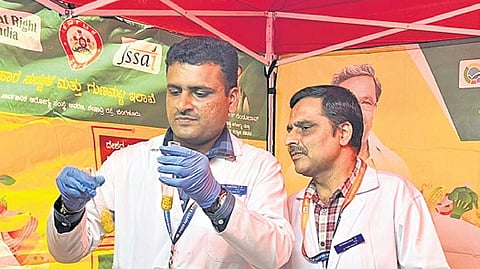

BENGALURU: In slightly over four months, 2,869 people used the rapid food testing kiosks set up by the then Food Safety and Standards Department, now renamed as the Food Safety and Drug Administration Department (FDA), in ten malls in the city — a number FDA officials consider low given the high footfall at these malls. The initiative also included awareness campaigns, which reached over 16,200 people, on food safety and adulteration risks.
The self-testing, done by consumers to test around 2,869 food samples, showed ‘no adulteration’ in any of the items, which officials say is a positive sign. However, they also pointed out that the absence of adulteration might lead people to question whether the kiosks are functioning properly, further affecting participation.
Elements Mall in Thanisandra recorded the highest number of testing samples, with 1,033 analysed and 4,258 people participating in awareness activities. It was followed by Meenakshi Mall with 359 samples tested and Phoenix Mall of Asia, where the inauguration of these food safety kiosks was held, with 299 samples.
The department had set up these kiosks on October 24, equipped with rapid tests and a magic box, to help the public check the quality of everyday food items. Rapid tests use quick chemical reactions to detect common adulterants, while the magic box is an FSSAI-designed portable kit containing multiple test tools for on-the-spot food safety checks.
With these safety kits at malls, people could test the quality of pulses, sugar, cooking oil, tea powder, salt, dairy products like milk, ghee, paneer and butter as well as vegetables, coriander powder, drinking water, and other essentials. An FSSAI-trained worker was also appointed at each kiosk to conduct the tests.
An FDA official managing one of the kiosks told TNIE that most visitors were primarily interested in testing the quality of their pulses. After pulses, ghee samples were the most commonly tested. “Initially, there was curiosity among the public, as they expected these tests to provide a detailed report on what they were consuming.
However, when they realised the process involved only basic checks, the footfall reduced. Maybe people are conducting similar tests at home as these just require everyday things to check,” the official said.
As per consumers and shoppers, the initiative was not marketed effectively, which they said could have resulted in low public participation. Many shoppers were either unaware of the kiosks or not interested in visiting them as they had to purchase things from outside and then perform the checks at the mall.